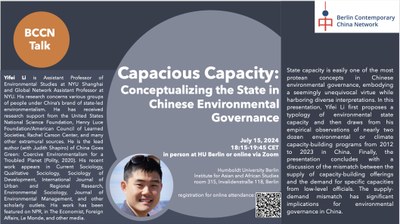Neuigkeiten
15.10.2024 BCCN & LMRG Talk: "Cosmic Futures: The Universe of Chinese Contemporary Science Fiction"
- https://www.iaaw.hu-berlin.de/de/ostasien/neuigkeiten/aktuelle-termine/15-10-2024-bccn-lmrg-talk-cosmic-futures-the-universe-of-chinese-contemporary-science-fiction
- 15.10.2024 BCCN & LMRG Talk: "Cosmic Futures: The Universe of Chinese Contemporary Science Fiction"
- 2024-10-15T10:00:00+02:00
- 2024-10-15T12:00:00+02:00
- Wann 15.10.2024 von 10:00 bis 12:00
- Wo IAAW, Seminar für Ostasienstudien, Johannisstraße 10, Raum 201.
- Name des Kontakts Merle Groneweg
-
iCal
Science fiction from China is booming worldwide and was already long before Netflix released Liu Cixin’s Three Body Problem earlier this year. What makes Chinese contributions to this genre so globally successful? What are the specific characteristics of Chinese science fiction? Or is it more about who writes it? What about the history and setting of science fiction in China itself? And does its special status tell us something about Chinese society's attitudes towards science and technology in general?
In this conversation event, we will explore both the position of China in science fiction and science fiction in China with renowned SF writer and researcher Regina Kanyu Wang (University of Oslo). After a short talk and discussion, there will be time for an open exchange on these topics with her.
Regina Kanyu Wang, born in Shanghai, is one of the most fascinating young voices on the Chinese science fiction scene. She is both a prolific writer of speculative fiction and a scholar who studies and contextualizes Chinese contributions to the genre. As a PhD research fello wat the University of Oslo, she’s working on a project about women writers in Chinese science fiction. She has received numerous Chinese awards for her writing, among them multiple Xingyun Awards, and she was nominated for two Hugo Awards in 2023. Wang has also edited two anthologies of translated Chinese science fiction and fantasy so far. One of them, The Way Spring Arrives and Other Stories, assembles stories entirely from women and non-binary writers.
This event is hosted in cooperation with Lise Meitner Research Group.
15.07.2024 BCCN Talk: “Capacious Capacity: Conceptualizing the State in Chinese Environmental Governance”
- https://www.iaaw.hu-berlin.de/de/ostasien/neuigkeiten/aktuelle-termine/15-07-2024-bccn-talk-capacious-capacity-conceptualizing-the-state-in-chinese-environmental-governance201d
- 15.07.2024 BCCN Talk: “Capacious Capacity: Conceptualizing the State in Chinese Environmental Governance”
- 2024-07-15T18:15:00+02:00
- 2024-07-15T19:45:00+02:00
- Wann 15.07.2024 von 18:15 bis 19:45
- Wo online via zoom or at Humboldt University Berlin, Invalidenstr. 118 Mon 15 July 2024 18:15 - 19:45 (CET)
- Name des Kontakts Merle Groneweg
-
iCal
State capacity is easily one of the most protean concepts in Chinese environmental governance, embodying a seemingly unequivocal virtue while harboring diverse interpretations. In this presentation, Yifei Li first proposes a typology of environmental state capacity and then draws from his empirical observations of nearly two dozen environmental or climate capacity-building programs from 2012 to 2023 in China. Finally, the presentation concludes with a discussion of the mismatch between the supply of capacity-building offerings and the demand for specific capacities from low-level officials. The supply-demand mismatch has significant implications for environmental governance in China.
Yifei Li is Assistant Professor of Environmental Studies at NYU Shanghai and Global Network Assistant Professor at NYU. His research concerns various groups of people under China’s brand of state-led environmentalism. He has received research support from the United States National Science Foundation, Henry Luce Foundation/American Council of Learned Societies, Rachel Carson Center, and many other extramural sources. He is the lead author (with Judith Shapiro) of China Goes Green: Coercive Environmentalism for a Troubled Planet (Polity, 2020). His recent work appears in Current Sociology, Qualitative Sociology, Sociology of Development, International Journal of Urban and Regional Research, Environmental Sociology, Journal of Environmental Management, and other scholarly outlets. His work has been featured on NPR, in The Economist, Foreign Affairs, Le Monde, and other media.
The event will take place at: Humboldt University Berlin, Institute for Asian and African Studies, room 315, Invalidenstraße 118, Berlin
Online attendance is possible via Zoom.
Registration: https://hu-berlin.zoom-x.de/meeting/register/u5IrdOqhrz4rG9f79OJZtj-ZkZcrSYBSMbCu
12.07.2024 BCCN Talk: “Reading China‘s 1930s Political Economy with Roberto Schwarz”
- https://www.iaaw.hu-berlin.de/de/ostasien/neuigkeiten/aktuelle-termine/12-07-2024-bccn-talk-reading-china-s-1930s-political-economy-with-roberto-schwarz201d
- 12.07.2024 BCCN Talk: “Reading China‘s 1930s Political Economy with Roberto Schwarz”
- 2024-07-12T14:15:00+02:00
- 2024-07-12T15:45:00+02:00
- Wann 12.07.2024 von 14:15 bis 15:45
- Wo online via zoom or at Humboldt University Berlin, Invalidenstr. 118
- Name des Kontakts Merle Groneweg
-
iCal
What is enabled by reading problems in political economy of early-20th century China through Roberto Schwarz' concept of "misplacement" or "misplaced ideas"? My ongoing work on Wang Yanan, whose writings in the 1930s-1950s were central to a certain (non-Communist) Marxist specification of political economics in China, will engage this question as a theoretical-historical problematic. Wang's imminent critique of "capitalism in China/ Chinese capitalism" proceeded by problematizing the rampant reifications of the categories of capitalism in academic economics and social scientific work in China in the 1930s and 1940s. Reading Wang's critique through and with Schwarz can benefit from theoretical engagements with the latter's concerns over colonized knowledges, production of incommensurate temporalities through narrativity, and the ideological embodiments of capital in the commodity form of labor. As much an historical-theoretical excavation, this essay will also function as a critique of the present.
Rebecca E. Karl teaches history at New York University-NY. Her most recent book is China's Revolutions in the Modern World: A Brief Interpretive History (Verso 2020) and she is the author of a number of other books and articles about China's modern and contemporary history. She is a founding co-editor of the positionspolitics.org website, and a member of the Critical China Scholars collective.
The event will take place at: Humboldt University Berlin, Institute for Asian and African Studies, room 315, Invalidenstraße 118, Berlin.
Online attendance is possible via Zoom.
Registration:
hu-berlin.zoom-x.de/meeting/register/u5YscuGtqj0jH9E8MW5A3Twwm0Bd-0TIv7rE
28.-29.06.2024 Current Research on Hokkien and Hakka: Close-up views from outside
- https://www.iaaw.hu-berlin.de/de/ostasien/neuigkeiten/aktuelle-termine/28-29-06-2024-current-research-on-hokkien-and-hakka-close-up-views-from-outside
- 28.-29.06.2024 Current Research on Hokkien and Hakka: Close-up views from outside
- 2024-06-28T09:00:00+02:00
- 2024-06-29T18:30:00+02:00
- Wann 28.06.2024 09:00 bis 29.06.2024 18:30
- Wo Section of East Asian Studies, Johannisstraße 10, 10117 Berlin, Room 201
- Name des Kontakts Prof. Henning Klöter
-
iCal

International colloquium for PhD students and postdoctoral researchers
Current Research on Hokkien and Hakka: Close-up views from outside
Humboldt-Universität zu Berlin
Institute of Asian and African Studies (IAAW)
28–29 June, 2024
Description: Hokkien and Hakka language communities are undergoing a strong shift towards Mandarin and other dominant languages. Thus, while they are reported to count some 45 million speakers each, the true number of speakers is presumably (much) lower. Outside Asia, research on these and other regional Sinitic languages is extremely scarce. Consequently, researchers often lack opportunities for academic exchange on ‘their’ language or language community. The goal of this workshop is to bring together junior and early-career researchers working on Hakka or Hokkien and to offer them an opportunity to present their research and engage in discussion with peers and specialists. It thus aims to contribute to the formation of a specialist network within Chinese linguistics and beyond and to stimulate future exchange and cooperation.
Conveners: Juliette Huber and Henning Klöter
Venue: Section of East Asian Studies, Johannisstraße 10, 10117 Berlin, Room 201
To register for the colloquium, please contact Juliette Huber at juliette.huberAThu-berlin.de. Participation through Zoom is possible if you are unable to join the onsite event.
Program
Invited discussants: Prof. Dr. Rint Sybesma (Leiden University, Dr. Jeroen Wiedenhof Leiden University)
Friday, June 28
9:00 | Welcome and introduction
9:30 | John Oliver Monghit (HU Berlin)
Philippine Hokkien through Time: A Comparative Exploration of Phonological Reconstructions
10:45 | Sievert von Stülpnagel (HU Berlin)
The Neutral Tone in Taiwanese Southern Min
11:45 | Joren Pronk (Leiden University)
The Taiwanese Sound System Under Day-to-Day Contact
14:15 | Round table: Teaching Hokkien: Experiences, potentials, and perspectives
Liu Chan Yueh (INALCO Paris), Wu Kuan-Wei (Ruhr-Universität Bochum)
Saturday, June 29
9:30 | Yves Menheere (Leiden University)
Taoism and Taiwanese: Some Experiences from the Field
10:45 | Thomas Fliß (Universität Trier)
Both Classical and Modern: Rhyming in Taiwanese Southern Min
11:45 | Henning Klöter & Leif Bartsch (HU Berlin & FU Berlin)
Early Witnesses of Hakka and Hokkien: Some Recent Discoveries
14:15 | Zou Chunyan (HU Berlin)
Language Shift and Maintenance of Hakka: An Ethnographic Study Conducted in a Hakka Town in West Guangdong
15:15 | Matthijs Verzijden (Leiden University)
Hakka san1go1 in Northern Taiwan
16:15 | Juliette Huber (HU Berlin)
Hakka in East and West Timor: An Overview of Differences and their Origins
02.05.2024 BCCN Talk: Musik als transgenerationales Medium zur Erinnerung und Kritik in China
- https://www.iaaw.hu-berlin.de/de/ostasien/neuigkeiten/aktuelle-termine/02-05-2024-bccn-talk-musik-als-transgenerationales-medium-zur-erinnerung-und-kritik-in-china
- 02.05.2024 BCCN Talk: Musik als transgenerationales Medium zur Erinnerung und Kritik in China
- 2024-05-02T18:00:00+02:00
- 2024-05-02T19:30:00+02:00
- Wann 02.05.2024 von 18:00 bis 19:30
- Wo IAAW, Invalidenstraße 118, Raum 315
- Name des Kontakts Dr. Daniel Fuchs
- Web Externe Webseite besuchen
-
iCal
Sehr geehrte Studierende, sehr geehrte Kolleg:innen,
wir möchten Sie herzlich zum BCCN Talk Musik als transgenerationales Medium zur Erinnerung und Kritik in China am 2. Mai 2024 einladen.
Mit: Andreas Karl (IFK Wien), Wang Xilin (Komponist), Wang Ying (Komponistin)
Zeit: 2. Mai 2024, 18:00-19:30 Uhr
Die Teilnahme ist in Präsenz und online möglich.
Veranstaltungsort: Humboldt-Universität zu Berlin, Institut für Asien- und Afrikawissenschaften, Raum 315, Invalidenstrasse 118, 10115 Berlin
Für eine Teilnahme via Zoom bitten wir um Registrierung unter: https://hu-berlin.zoom.us/meeting/register/u50kdOyqpjgqGNXdDwXcrWWZY8XjxOjnH3kl#/registration
Der renommierte Komponist Wang Xilin (*1936) hat die widersprüchliche Beziehung von staatlicher Anerkennung und Tabuisierung in China erlebt. In seiner Musik werden die durch die Kulturrevolution (1966-1976) sowie das Tian’anmen-Massaker (1989) erlebten Traumata thematisiert und an die nächsten Generationen weitergegeben. Anhand eines Impulsvortrags des Musikwissenschafters Andreas Karl und Beiträgen von Wang Xilin sowie seiner Tochter und Komponistin Wang Ying wird die komplexe Kulturpolitik Chinas anhand der ästhetischen und inhaltlichen Transformation von Musik diskutiert. Im Zentrum der Veranstaltung steht die Frage, inwieweit Musik als transgenerationales Medium zur Erinnerung und Kritik in der Volksrepublik China betrachtet werden kann.
Wang Xilin ist einer der profiliertesten Komponisten Chinas. Bereits in den 1960ern erlangte er mit seinen Orchesterwerken im chinesischen Stil nationale Berühmtheit. Seine offene Kritik an der Kulturpolitik Mao Zedongs kostete ihn während der Kulturrevolution beinahe das Leben. Auch nach seiner Rehabilitierung blieb er eine kritische und anklagende Stimme.
Wang Ying ist eine chinesisch-deutsche Komponistin. Ihre Ausbildung hat sie in Shanghai und Köln absolviert. In ihren Kompositionen beschäftigt sie sich mit Themen wie Umweltverschmutzung, politischer Verfolgung, erzwungene Migration, Identität und Herkunft.
Andreas Karl ist Musikwissenschaftler, Librettist und Musiker. Sein Forschungsschwerpunkt liegt auf neuester zeitgenössischer Musik in China und Europa. Er ist derzeit Research Fellow am IFK Wien. Zwischen 2018 und 2022 hat er am Zentralkonservatorium in Peking gelehrt und geforscht. In seiner Dissertation beschäftigt er sich u.a. mit dem Musiktheater der chinesischen Diaspora in Deutschland.
Die Veranstaltung findet in deutscher Sprache statt.
Weitere Informationen finden Sie unter: https://berlincontemporarychinanetwork.org/events/detail/musik-als-transgenerationales-medium-zur-erinnerung-und-kritik-in-china-music-as-a-transgenerational-medium-for-remembrance-and-criticism-in-china
Wir freuen uns auf Ihre Teilnahme!
Herzliche Grüße,
Daniel Fuchs





